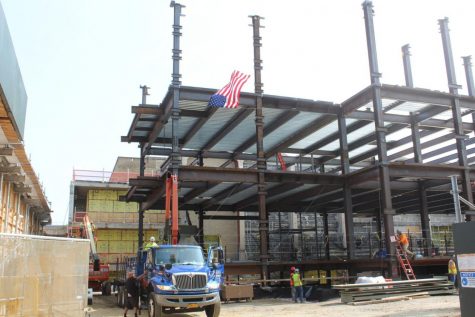Public Safety Explains Winter Weather Procedures
According to John Carroll, Public Safety ensures that campus pathways are always clear in the case of snow or ice. (Courtesy of Ram Archives)
January 29, 2020
When there is a prospect of snow, many Fordham students wait for an alert from Public Safety announcing that classes have been cancelled. Fordham Public Safety sends out severe weather alerts through email and certain updates about campus closures and reopenings through text messages.
On Jan. 7, most of the university’s staff and students were still on Christmas vacation, but Public Safety sent out an alert over text messages to confirm that the system of communication would work efficiently in the event of a real emergency. These alerts are sent out to all registered phone numbers and email addresses.
John Carroll, associate vice president of Public Safety, said the Emergency Management Team, which consists of members and faculty from the Fordham community, always tries to notify the rest of the university of a closure or cancellation with sufficient time to plan ahead.
“One of the most significant reasons for delays, closures and cancelations is travel conditions,” said Carroll.
Commuters make up a large percentage of the Fordham community. Carmen Wynn-Santana, FCRH ’23, is a commuter from the neighborhood around W. 234 Street and takes the bus every day regardless of the weather. She said it is the easiest and most affordable form of transport.
“In [my] experience, commuting is a toss-up when the weather gets bad,” said Wynn-Santana. “I’m almost guaranteed to have clear roads in my area when it gets snowy or icy because of the great amount of people that depend on public transport here.”
Wynn-Santana said it usually takes around 30 minutes to an hour to get to the Rose Hill campus, but snow plows and road closures delay her commute.
“On several occasions, I have found myself walking two miles to campus because I will get there faster than if I sat on the bus for an hour in stand-still traffic,” Wynn-Santana said.
Wynn-Santana said she and many other commuters rely on public transportation in order to get to school.
Wynn-Santana said there have been instances when she has not been able to make it to her morning classes because the bus never came, which is a gamble, especially in inclement weather.
“I’m not sure if there is anything that Public Safety can do about this problem, but nonetheless I find it important that we make as many people as possible aware of this problem because it is not something that we can control, so it should not reflect badly on commuter students who may miss their classes because they were unable to get there in the first place,” Wynn-Santana said.
Similarly, Sabah Munshi, FCRH ’23, commuted during her first semester of the 2019-20 school year from Piscataway, New Jersey, which is around an hour to an hour and a half from the Bronx.
Munshi said she left her house at least two hours before her first class of the day. She said she drove a car and therefore had to take the George Washington Bridge every morning.
Munshi said there was one instance when the bridge was closed due to the danger of ice falling on cars.
“I had a final exam this day, and I was terrified I was not going to be able to make it on time,” Munshi said. “Fortunately, I was able to find a faster route to decrease my traffic time and was able to make it to campus.”
For the spring 2020 semester, Munshi moved on campus and no longer commutes, but said that commuting taught her to always be prepared for anything on the road.
“Whether it be traveling through bad weather or being stuck in traffic, leaving the house earlier in order to give yourself more time is always more helpful down the road because the commute is always unpredictable,” Munshi said.
Although many students look forward to closures, Carroll said Public Safety will only announce a closure or cancelation if it is absolutely necessary for the safety of the staff and students who are on campus daily.
“We do not seek to close; we seek to educate; but we must value the safety of our community as our top priority,” said Carroll.
Unlike most public high schools, Fordham does not have any days that must be set aside in the event of a snow day throughout the year.
“The university is not a K-12 operation and has no allotted snow days — every class is important,” Carroll said.
Over Martin Luther King, Jr. weekend, it snowed significantly on Sunday. Since there were no classes, on-campus students were, for the most part, not affected.
However, the maintenance staff snow plowed throughout the day and cleared most of the sidewalks even as the snow was still falling.
Carroll said the university prioritizes student safety first and foremost — even if that requires extra work by the dedicated facilities staff.
Regardless of the weather prediction at the beginning of the winter, Public Safety orders the equipment, material and vehicles they need in order to remove snow and ice from the campus adequately, said Carroll
John Puglisi, associate vice president for Facilities Management, said the facilities staff will typically wait for at least an inch or two of snow to plow overnight, and facilities will put down salt once the snow has slowed or stopped.
“Sidewalk clearing starts with the first bit of accumulation, especially in areas of congregation like McGinley Center,” said Puglisi.
Facilities and Public Safety urge all students to report dangerous icy conditions in order to keep everyone on campus safe this winter.












If you want a picture to show with your comment, go get a gravatar.